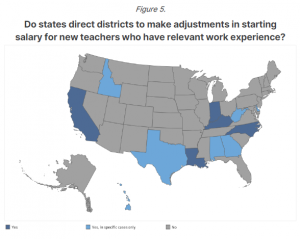The National Council on Teacher Quality (NCTQ) released its report “State of the States 2022: Teacher Compensation Strategies” earlier this month. This report takes a deep dive into the compensation strategies each state and the District of Columbia use to continue to recruit and retain talented instructors.
Instructors are the backbone of high-quality Career Technical Education (CTE) and are essential to ensuring that each learner is fully supported by the career preparation ecosystem of their state. “Teacher Compensation Strategies” divides compensation strategies into three different categories: 1) Differentiated pay; 2) Performance pay, and 3) Pay for prior work. While the first two offer their own merit, and all can perhaps be used in some combination, pay for prior work may offer an elegant solution for staffing CTE teachers.
A common barrier to CTE teacher recruitment and retention is matching instructor salaries, which are historically lower than industry salaries talented CTE instructors often transfer from. In an effort to reduce the gap, states can offer instructors an increase in pay based on experience from non-school related careers relative to the subject matter they are teaching. This strategy embraces the promise to capture and value all learning that occurs, wherever and whenever it occurs. Below are some highlights from the report on the current application of this strategy::
- When it comes to paying for prior experience, only five states—California, Indiana, Kentucky, Louisiana, and North Carolina—grant extra pay for relevant prior experience in another industry and allow administrators the discretion to determine its relevance.
- Six states—Alabama, Delaware, Georgia, Idaho, Texas, West Virginia—allocate pay for prior experience in non-academic industry in selected cases only. The majority of those states limit this extra pay to teachers of CTE only. Hawaii limits this extra pay to those who have prior military experience.
- Thirty-nine states make no mention of adjustments in starting salary for prior relevant experience for individuals entering teaching from other professions.

Of the states currently using pay for prior experience strategies, North Carolina and Louisiana took two different approaches. North Carolina, per the report, awards one year of credit per two years of relevant, non-education work experience pre-bachelor degree, and a one-for-one exchange post attaining a bachelor’s. Louisiana school districts are required to develop compensation plans that take into account effectiveness, experience, and demand with no one factor being given a weight of more than 50 percent. The report highlights that language surrounding this particular strategy is often vague which makes it hard to track if it is being enacted.
With teacher attrition at unprecedented levels and teacher recruitment levels dropping, state CTE leaders have the opportunity to provide innovative solutions to teacher compensation. You can read the full report here: State of the States 2022: Teacher Compensation Strategies. Advance CTE’s Learning that Works Resource Center provides additional tools on embedding credit for prior learning and other state approaches to fully documenting skills.
Brice Thomas, Policy Associate
